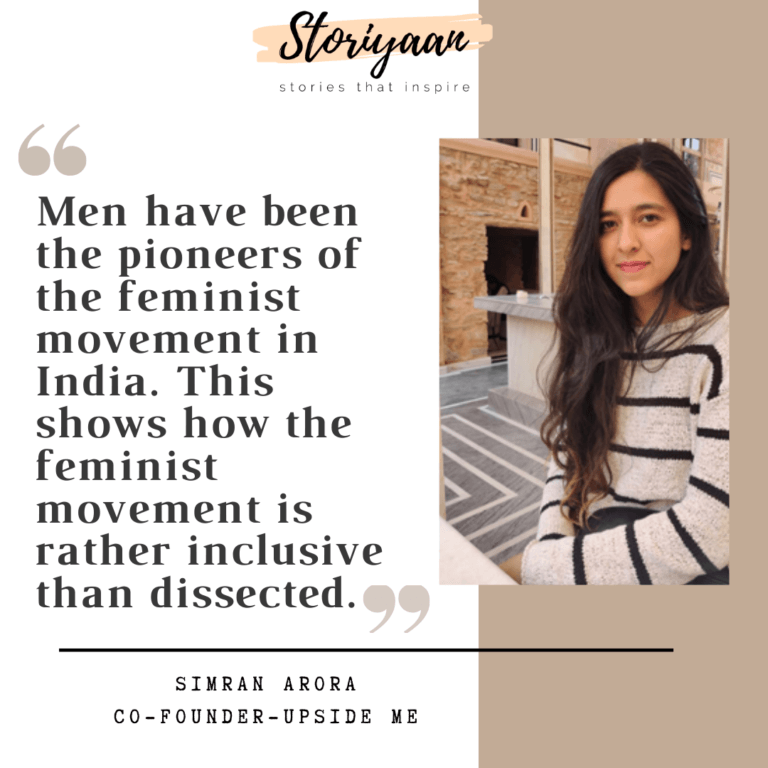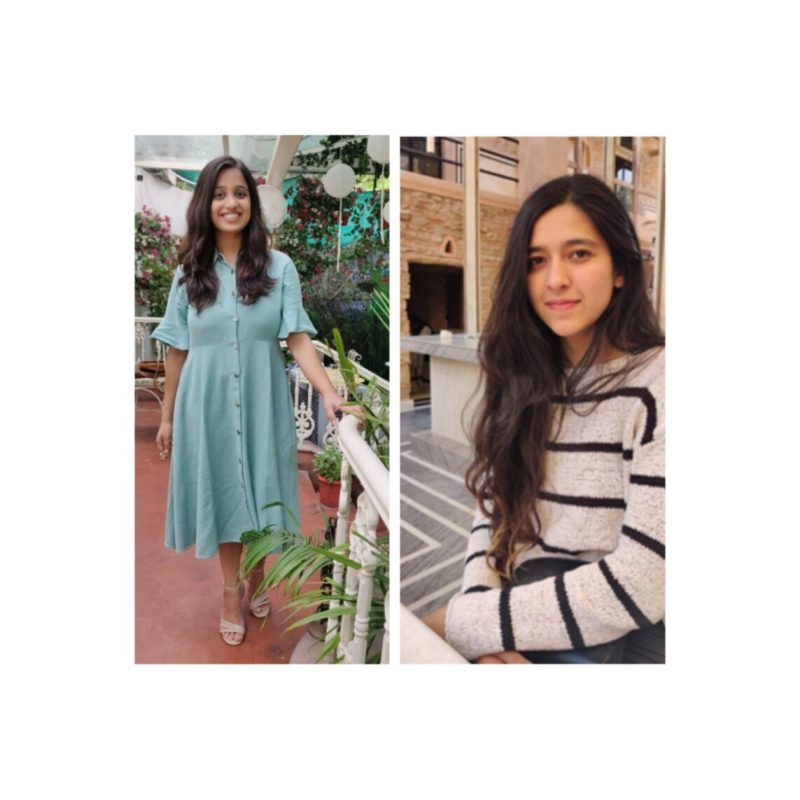Simran being philosophical, incorporates her thoughts in bringing women together in order to bring change in the gender space; whereas, Richa, a professional martial artist, is fierce to any injustice as well as empathetic to the extent that she’ll go out of her way to bring change.
Together, they formed UpsideMe, a well-defined voice for women around the country. It was created in order to break the medivial stereotypes and standards set for women. UpsideMe is about the celebration of Womanhood in all it’s shapes, forms and age.
We had a chance to sit with the brilliant co-founders who told us all about the mission of their initiative.

Interview
Questions and answers
Can you start by talking about what womanhood means to you?
Womanhood is a beautiful experience weaved with its intricacies. However, being a woman is beyond biological or gender realms. Many schools of thought associate womanhood with strength, beauty, sacrifice, emotions, but we beg to differ. It is anything and everything beyond definitions.
For us, womanhood is far from any conventional ideas that box a woman into a type. While we would love to call women strong and powerful, we also feel it is okay if no adjective fits you. We don’t want to preach that womanhood is about sacrifices; hence, women should be respected. We are here to tell everyone that womanhood can not be only about sacrifices and that women should be respected despite that. It comes so differently to each one of us that delimiting it into some ideals is like challenging the other lot to meet those ideals. In brevity, womanhood is a distinct journey of every woman, spiraled together with some commonalities. Yet it is different for each one of us.
Talk to us about the inspiration behind Upside Me. What triggered the formation of this collective support?
Upside Me, or as we like to define ourselves, the unfiltered woman was a product of our conversations. As women ourselves, we remember how we repeatedly talked about the not so ideal moments we encountered. We always heard of certain ideals women had to fit in or multiple hats women had to wear to suit the definitions of a woman. That’s when we had our eureka moment. We wanted Upside Me to be about challenging such narratives. We had different content buckets in mind to engage our audience. We knew what we wanted to do and had to chart out the implementation. While we started as a page, we have a roadmap to build our own women’s community as the next step.
Your most recent post on Instagram talks about the elaborative meaning of the word "No." It is very often a misunderstood expression (for reasons still debatable). Can you please talk a little more about it?
Let’s dive into our favourite Bollywood movies. The hero pursues the heroine, the heroine shyly says no yet likes the man, the hero’s consistent persuasion, and boom, they fall in love. This is what we are trying to evade. The movies mirror the society but also end up influencing our understanding of the expression. Our post tries to paint a picture of how the expression does not have any underlying meaning in the expression.
With the most impactful line being- “No, doesn’t mean, I can say yes later.”
Let’s go back to the classic Pride and Prejudice and notice how Elizabeth’s rejection of Mr. Collins’s proposal was so powerful for the times when the novel was written. Besides his constant urge to marry her and assume that she will change her mind, she did not shake her decision. This was one of the best representations of the expression for those times, which sadly, we are still trying to represent better in the 21st century.
A Quote or idea that changed your mind-
“Whether you think you can or you can’t, you’re right” – Henry Ford
This one line speaks more to us than any other phrase. There are theories about the Confidence Gap, which tell us how women are less self-assured than men, even if they have the same skill set as their male counterparts. The need of the hour is self-belief and self-confidence, which can easily help us build our growth trajectory.
We'd like to push things a little and ask you this: give us your opinions about FemiNazis and how (if it's real) it differs from an actual Feminist?
Whenever an ideology is formed, there are different perceptions of it. Going by the definition, the term “FemiNazis” is coined to call out the radical feminists. We’d say this is absurd for us to hear because anyone fighting for equal rights cannot be a “Nazi.” There will always be loopholes in understanding or differences in the implementation of ideologies. Still, we do not concur in defining an entire term for someone, who people think, is abusing the movement.
There's a post on your Instagram about how we need to stop thinking about fitness as a cosmetic need. What was your idea/message behind that?
Fitness is mostly seen as a want rather than a need. Someone is seen adopting it only when they want their body to look different. We are trying to move away from this idea. With the help of our fitness mentors, we are trying to put across the message to see fitness as a daily need, irrespective of how you look today. A person can be well in shape and still have terrible stamina.
Also, we see women afraid of becoming muscular. The fragility associated with a woman’s body is something we need to move away from. We are trying to dispose of these gender definitions ascribed to men with a muscular physique and women with a tender one.
Do you have a male feminist, that you've looked up to or admire? What do you think differs from a male feminist to a female one- if their thoughts differ at all?
Men have been the pioneers of the feminist movement in India. This shows how the feminist movement is rather inclusive than dissected. Among the early crusaders, we admire the efforts of Raja Ram Mohan Roy, whose consistent efforts led to the abolition of Sati in the 19th century. The formation of Brahmo Samaj was a huge milestone in altering the socio-religious structure of the country.
However, we are not really in favor of striking a gender dichotomy in the movement. We believe everyone is free to voice what they believe in. Hence, we would rather not differentiate a male feminist from a female feminist.
Your page isn't one that somehow sounds or is aggressive. Rather, it has memes and often makes something more out of regular Bollywood memes? Was that the idea or motto- to keep the page light-hearted?
As we described ourselves earlier, we are representing the unfiltered woman. We are trying to show the challenges this woman goes through, and how she is totally different from the perfectionist, we try to imagine.
To depict this, we use different content buckets such as serious quotations or sometimes Bollywood memes. The reasons for using memes along with empowering liners, are bi-fold. Firstly, more than three-fourths of the audience is engaging with memes on the internet. To ensure that our content resonates with the younger generation, we mask our message in such content forms. Secondly, there are things all women can relate to, such as the wait (yet no wait) for our periods every month or even bargaining during our shopping sprees. This is the woman that no one should be ashamed of being, and we all are too similar here. That’s why we try to make the content light-hearted so everyone can share a giggle while they remember us at the same time.
"Feminists are angry, man-hating lesbians" - this was said by Ann Coulter, an American pundit, and Lawyer. What do you think about this remark? And if you were to give a reply to her, what would it be?
Women have been oppressed for centuries, and if this has made some of us angry, we would rather validate the anger.
However, the feminist movement should not be confused with misandrist. It is about involving men to battle the patriarchy. It is the least about women against men. Instead, it is every gender against patriarchy. We are true admirers of the men who initiated the feminist movement in India. We must understand that patriarchy not only affects women but also sets utopian roles for men, which restrict them.
Moreover, women undoubtedly love fellow women. It is hard to find a closer relationship than two female best friends or a mother and daughter or two sisters or even two women who met on a crossway and suddenly appreciate each other. The sorority is nurtured so well that women are the biggest supporters of women. However, using terminology to relate this kind of relationship sexually is incorrect.
Gender Roles in society somehow, still remain a matter of controversy and discussion. What are your opinions on Gender Roles?
Some thoughts have been nurtured in society for a long time. Right from the start, we have seen a clear divide: our mothers being our emotional cocoons and our fathers holding the purse strings. Owing to the ongoing progress, some of us might have had a different sight of this family structure. One cannot deny that the rigidity of the social construct is still ingrained for most of us.
We are trying to remove the “gender” alignment with “roles” with each content piece we create.
We are trying to move to a gender-neutral space where being muscular is not “manly,” or wearing/liking pink is not “girly.” This space is more inclusive and flexible. We believe that rigid gender roles are bridling every person from becoming their true selves.
Can you let us into a life-changing moment that led you to be who you are today?
We think whatever we are today is because of the support we got from each other. The life-changing moment for us has to be the time when we met each other and started to plan the initiation of Upside Me. We are strong advocates of women bonds, and that’s what Upside Me is a product of. A women’s tribe is capable of changing the world around us.
Since we're here, can you (if you read) recommend at least three books about womanhood (fic/nonfic) for every gender to read?
We would like to recommend these three books: The Color Purple by Alice Walker, Pride, and Prejudice by Jane Austen and The Palace of Illusions by Chitra Banerjee Divakaruni.
The Color Purple is a pragmatic depiction of a woman battling the odds, supported and thrust forward in her life by fellow women. This book beautifully celebrates sisterhood and unabashedly talks of female sexuality and lesbian relationships.
Pride and Prejudice, set in the 19th century, is remarkably progressive for the times it was set in. The novel charts reformist character sketches such as that of Elizabeth Bennet, who marked the emergence of female individuality in women’s characters.
Lastly, The Palace of Illusions portrays Mahabharata through the eyes of Draupadi. We always see Mahabharata as the story of five heroes, but we fail to recognize the role of women in the narrative. It’s a good read to understand another point of view on the epic.
Who inspires you as a woman?
Other women. We read this quote lately, which said- “Behind every successful woman, there is a tribe of other successful women, who have her back.” The sorority is what we live for. Women supporting women and building each other is the best thing in sight. This is what we try to nurture on our platform.
Quick 5 :
1. Makeup: Mood
2. Periods: Big deal?
3. Tax on Female Hygiene products: Unreasonable
4. Feminism: Need
5. Women not wanting to wear Bras: Choice!

